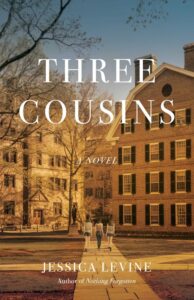
What Does It Mean to Forgive Your Mother?
Jessica Levine Grapples with the Complexity of Release
My artistic mother, Cass (short for Carolyn), began drinking and being abusive when I was on the threshold of puberty. Although Betty Ford’s public admission of alcohol and substance abuse would begin a shift toward destigmatization, alcoholism was still seen as shameful in the 1960s and 70s, and my extended family’s denial of her drinking left me with little understanding of why she yelled so much and sometimes threw things, with a couple of slaps thrown in.
I put her rage down to a passionate temperament ignited by the stresses of the day: her frustrations as a commercial artist in a male-dominated field, my father’s bankruptcy, and the failure of a mail order business she started to save us. In the background, ever present, the atrocities of the Vietnam War fueled her anger at the insanity of men. My mother was a feminist before the word was used in conversation. I’d only begin to understand the social and cultural context of her rage many years later.
Her tantrums targeted my father at times, but I was the preferred object. My kinky Jewish hair, in particular, drove her mad. “You could be so beautiful if you wanted to,” she would say, grabbing my unruly long hair and yanking it back. Finally she took me to a hairdresser who chopped it all off. In her mind, my short haircut was chic, reminiscent of French women she admired. But as an overly tall girl, I felt it made me boyish and strange at a time when I needed to feel attractive. The devastation to my self-esteem went on for years. I was too frightened to object or fight back.
When I was a baby, my father, who’d been in Freudian psychoanalysis for years (as was la mode for secular New York Jews in the 50s and 60s), enrolled me in a longitudinal personality study started by two New York psychiatrists. They came to our home periodically to observe me and take notes. Then I turned twenty-one, and Dr. Thomas, who by then knew not only me but my parents quite well, informed me that my files were now available for me to look at and, if I needed, I could have some free therapy. I took him up on the offer.
With her at a safe distance, I saw the qualities she’d given me: love of travel and nature, creativity, non-conformism, resilience and adaptability. And in a magical whoosh, her shadow lifted, and I forgave her.
In one of our sessions, when I was working through the self-hatred my mother had carefully cultivated in me, Dr. Thomas said, “You realize she’s an alcoholic, right?” No, I hadn’t realized it, and I was flummoxed. I’d seen my parents having daily cocktails, but had never processed how many and how often. It was their social ritual: they gathered in the living room for a drink when my father came home from work, then there was wine with dinner. But after that session with Dr. Thomas, I began to notice that my mother sometimes had a scotch in the pantry or tucked behind a kitchen appliance that she’d sip starting late morning. I had a new explanation for her rages.
I was thirty-three when she died. Her body at the funeral home was cold, and she had a frown on her face. I snipped off some of her hair, weeping hysterically. I cried for three months straight, mourning the mother I’d never had. In graduate school at NYU, I’d cross Washington Square Park sobbing hysterically as I made my way to classes. At the same time, there was relief. This is not uncommon: an abusive parent dies, and the child experiences both mourning and relief. There followed years of psychotherapy, which honestly weren’t that helpful. But life itself primed me to forgive.
When I became a mother of young children, I experienced the mother-rage that women experience when their work, their creativity, their patience, and their very ability to focus are undermined on a daily basis. I’d read about maternal rage in Adrienne Rich’s Of Woman Born, and now, as I lived it, I was horrified to see myself turning into my mother. No alcohol needed, it happens in a society where being a mom means that your concerns come last. In order not to turn into a mirror image of the Fury named Cass, I practiced shutting myself up in the bathroom and breathing when I felt I was losing self-control.
Around that time, I decided to train to become a hypnotherapist. As is customary in any therapeutic training, I received as well as gave sessions. One session I received from my mentor proved to be a turning point. He led me into hypnosis with the intention of helping me release my mother-wound. My inner visualization took me to the edge of a deep ravine. On the other side stood my mother, dressed in full khaki. Appropriate for Cass, whose work as a commercial artist had left her with “color fatigue” and a craving for the tranquility of beige. And there she was in beige from head to toe, strong and proud. With her at a safe distance, I saw the qualities she’d given me: love of travel and nature, creativity, non-conformism, resilience and adaptability. And in a magical whoosh, her shadow lifted, and I forgave her.
Or did I? Was it forgiving or releasing? Or just understanding more deeply the causes of her anger and alcoholism? Much has been written on the subject of forgiveness, but there is no one-size-fits-all method to get there, nor is it always desirable. In the best case scenario, the abuser repents, demonstrates an intent to change, and asks for forgiveness. In such a case, relationships can sometimes be mended. But if there’s continued denial and no contrition, it may be healthier for the victim/survivor to take distance without forgiving.
Forgiving one’s mother is a particularly difficult task, because without mother love a child has to invent everything from scratch. For women especially this becomes an exhausting enterprise. How to be female, how to love, how to be a mother (or whether to avoid motherhood in order not to repeat history) become issues that can haunt one for decades.
In my case, I was fortunate my mother died when I was in my early thirties. The intervening years gave me the distance I needed to heal and let go. Having mourned the mother I didn’t get to parent me, I am more able to love the one that’s gone. And, unlike many children of alcoholics, I was fortunate my mother began drinking when I was twelve and not earlier, fortunate I could go back to the years before she started drinking and find in my memory bank some sweet spots: her teaching me to swim in the Long Island Sound when I was four; the two of us playing double solitaire on a warm summer night; her bringing me sliced oranges when I was doing homework.
It’s comforting to remember that in my early years, there was love, there was concern. As for her later metamorphosis into the Medusa, well, she was a talented woman who yearned for a career that escaped her, a female artist in a man’s world. The older I get, the more of this I can relate to. And the older I get, the more I am my own person, and in the end it doesn’t matter what she did to me, or if I’ve forgiven her completely—or not.
________________________________________
Three Cousins by Jessica Levine is available via She Writes Press.
Jessica Levine
Jessica Levine is the author of The Geometry of Love (She Writes Press, 2014), a top-ten women’s fiction title in the American Library Association’s Booklist in 2015, and Nothing Forgotten (She Writes Press, 2018), which won the Next Generation Indie Book Award. The prequel to these two novels, Three Cousins, is forthcoming from She Writes Press in April of 2025. She is also the author of Delicate Pursuit: Discretion in Henry James and Edith Wharton (Routledge, 2002). Her essays, short stories, and poetry have appeared in many publications including The Southern Review and The Huffington Post. She has translated several books from French and Italian into English. Jessica holds a PhD in English literature from the University of California at Berkeley, where she was a Mellon Fellow. She was born in New York City and now lives in Northern California. You can find her at www.jessicalevine.com. Jessica has been a practicing hypnotherapist since 2005. You can learn about her work at www.levinehypnotherapy.com.




















